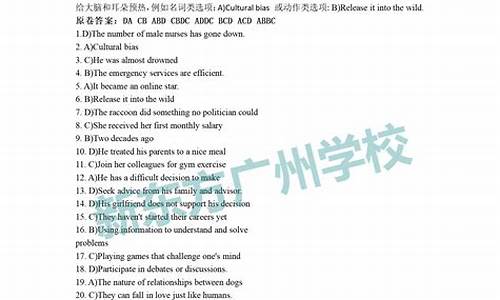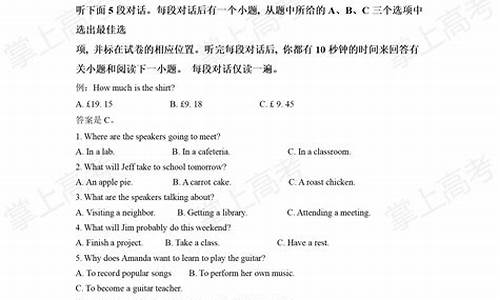您现在的位置是: 首页 > 教育改革 教育改革
2017高考听力真题,2017高考听力答案陕西
tamoadmin 2024-06-24 人已围观
简介1.河北英语高考题2017年2.2017全国高考英语听力一样吗3.2017年4月1日托福听力真题及解析4.2017年12月全国大学英语四级考试听力真题及解析高考各科的分值为:文科:语文150分,数学150分,外语150分,文科(政治100分,历史100分,地理100分)综合300分,共计750分。理科:语文150分,数学150分,外语150分,理科(物理110分,化学100分,生物90分) 综合3
1.河北英语高考题2017年
2.2017全国高考英语听力一样吗
3.2017年4月1日托福听力真题及解析
4.2017年12月全国大学英语四级考试听力真题及解析

高考各科的分值为:
文科:语文150分,数学150分,外语150分,文科(政治100分,历史100分,地理100分)综合300分,共计750分。
理科:语文150分,数学150分,外语150分,理科(物理110分,化学100分,生物90分) 综合300分,共计750分。
此外,上海地区高考总分为660分,各科分值为:语文150分、数学150分、外语150分,不分文理科,此外考生自主选择的3门选考科目,每门满分均为70分。
江苏省高考总分值为480,各科分值为:语文160分,数学160分,外语120分,共440分。文科类的语文、理科类的数学分别另设附加题40分。需注意在江苏新的高考模式中,总分值设置为750分。考试采取“3+1+2”模式。其中“3”是指统一高考的语文、数学、外语3个科目;“1”是指考生在物理、历史两门选择性考试科目中所选择的1个科目,“2”是指考生在思想政治、地理、化学、生物4门选择性考试科目中所选择的2个科目。语文、数学、外语3门统考科目,每门150分,其中外语科目含听力考试30分。3门选择性考试科目每门100分。其中,物理、历史以原始分计入总分;其余科目(思想政治、地理、化学、生物)以等级分计入总分。
部分地区总分为660分,各科分值设定为:语文150分、数学150分、外语150分,不分文理科,其中外语有两次考试机会,最终选择其中较好的一次成绩计入高考总分。此外考生自主选择的3门选考科目,每门满分均为70分。
有些地区(如内蒙古、新疆、辽宁、山西等)听力部分的成绩不计入总分,作为单列的一项成绩在投档时提供给高校参考;非听力部分120分换算为150分,换算办法:按考生非听力部分的卷面成绩乘以1.25,换算为外语科目成绩。有些地区(如辽宁、广东、河北、湖北、湖南、江苏、福建、重庆等)听力一年考两次,是需要计入高考总分的,并且可以取较高一次成绩计入总分,其他英语笔试题目满分120分。
全国统考科目中的外语分为英语、俄语、日语、法语、德语、西班牙语等6个语种,由考生任选其中一个语种作为考试科目(如:安徽、北京、福建、甘肃、广东、广西、贵州、河北、河南、黑龙江、湖北、湖南、吉林、江西、辽宁、内蒙、宁夏、青海、山东、山西、陕西、四川、天津、西藏、新疆、云南、重庆等27个省市高考满分为750分)。
传统高考模式
传统高考模式就是以前那种采取文理分科的方式进行高考,语数外三科,每科150分,文科的政史地三科每科一百分,理科的物理110分,化学100分,生物90分,使用的试卷是全国卷,按照地区划分,一共三卷。
传统高考模式一直被认为对学生的发展有所限制,一直被教育专家和学生及家长诟病,所以不是很适合当下的适合发展。
新高考模式
新高考模式是我国实行的一种全新的高考模式,目的就是改变传统高考对学生发展的限制,让学生拥有更多的可能。
新高考模式采用3+1+2的形式展开。
以湖北省为例,3是指语数外三个必选科目,每科的分数为150分,1是指选考科目,从历史和物理两科中选一科参考,分值为100分。2是选考科目,从地理、政治、化学、生物四科中选择两科参加考试,每科的分数为100分,总分就是必考三科的450分加上物理或历史选考的100分再加四科选两科的200分,一共750分。
新高考模式已经在多个省份开始试点,完善后就将全国推行,取代传统高考模式。
部分地区根据地方政策,总分有所不同。
以海南和江苏为例,海南省也采用了新高考模式,但是除了必选的三科的450分和选考科目的300分之后,该省的总分计算还计入了考生会考分数的百分之十,满分为150分,所以海南省的高考总分达到了900分。上海满分660分。
河北英语高考题2017年
2017年高考使用全国Ⅰ卷的省份:
福建、河南、河北、山西、江西、湖北、湖南、广东、安徽。
山东省部分科目使用全国Ⅰ卷:
全国Ⅰ卷;外语、文综、理综, 自主命题:语文、文数、理数。
扩展资料:
(新课标Ⅱ卷)
2015年及其之前:贵州 甘肃 广西 青海 西藏 黑龙江 吉林 宁夏 内蒙古 新疆 云南 辽宁(综合)海南(语文 数学 英语)。
2015年增加省份:辽宁 (语文 数学 英语)。
2016年增加省份:陕西、重庆、;取消省份:广西 云南 贵州。
2018年使用省区:甘肃、青海、黑龙江、吉林、辽宁、宁夏、新疆、内蒙古、陕西、重庆、海南(语文、数学、英语)西藏2018使用的是全国三卷。
参考资料:高考试题全国卷_百度百科
2017全国高考英语听力一样吗
许多在眼前看来天大的事,都不是人生一战,而只是人生一站。确实高考备战让你们很辛苦,可是已经坚持了这么久,这就已经是胜利。祝高考成功!下面是我为大家推荐的河北英语高考题2017年,仅供大家参考!
河北英语高考题2017年第I卷
注意事项:
1.答第I卷前,考生务必将自己的姓名、准考证号填写在答题卡上
2.选出每小题答案后,用2B铅笔把答题卡上对应题目的答案标号涂黑。如需改动,用橡皮擦干净后,再选涂其他答案标号。不能答在本试卷上,否则无效
第一部分听力(共两节,满分30分)
做题时,先将答案标在试卷上,录音内容结束后,你将有两分钟的时间将试卷上的答案转涂到答题卡上
第一节(共5小题;每小题1.5分,满分7.5分)
听下面5段对话。每段对话后有一个小题,从题中所给的A、B、C三个选项中选出最佳选项,并标在试卷的相应位置。听完每段对话后,你都有10秒钟的时间来回答有关小题和阅读下一小题题。每段对话仅读一遍。
例:How much is the shirt?
A.£19.15. B.£9.18. C.£9.15.
答案是C。
1. Where is Mary?
A. In the classroom. B. In the library. C. On the playground.
2. How much should the man pay for the tickets?
A. $16. B. $12. C. $6
3. Why can?t the woman give the man some help?
A. She is quite busy now.
B. She doesn?t like grammar.
C. She is poor in grammar,too.
4. What happened to Marx?
A. He lost his way.
B. He found his bike missing.
C. He lost his wallet.
5. Why did the man fail to attend the party?
A. He forgot it.
B. He didn?t know about the party.
C. He wasn?t invited to the party.
第二节(共15小题;每小题1.5分,满分22.5分)
听下面5段对话或独白。每段对话或独白后有几个小题,从题中所给的A、B、C三个选项中选出最佳选项,并标在试卷的相应位置。听每段对话或独白前,你将有时间阅读各个小题,每小题5秒钟;听完后,各小题将给出5秒钟的作答时间。每段对话或独白读两遍。
听第6段材料,回答第6、7题。
6. Why must the man drive to work?
A. It is the quickest way.
B. He has to use his car after work.
C. He lives too far from the subway.
7. What?s the relationship between the speakers?
A. Boss and employee.
B. Grandmother and grandson.
C. Teacher and student.
听第7段材料,回答第8~9题。
8. When is Alice?s birthday?
A. Tomorrow. B. The day after tomorrow. C. Today.
9. What will the two speakers buy for Alice?
A. A recorder. B. Some flowers. C. A box of chocolates.
听第8段材料,回答第10~12题。
10. What does the woman do in the group?
A. Play the piano. B. Play the violin. C. Sing for the group.
11. Who is Miss Pearson?
A. Leader of the group.B. Director of the group. C. Teacher of the group.
12. How often does the group meet?
A. Once a week. B. Twice a week. C. Every third week.
听第9段材料,回答第13~16题。
13. Who possibly is the woman?
A. An air hostess. B. A native Indian. C. A travel agent.
14. How long does the trip last?
A. Seven days. B. Eight days. C. Nine days.
15. What will the man probably do at the second stage?
A. Do some shopping. B. Visit the Taj Mabal. C. See wild animals.
16. What will the speakers do next?
A. Say goodbye to each other.B. Find out the price. C. Go to India by air.
听第10段材料,回答第17~20题。
17. In what way does Jack like to travel?
A. With a lot of people.
B. With one or two good friends.
C. All by himself.
18. What does Helen prefer on holiday?
A. Staying at home.
B. Seeing famous places.
C. Enjoying nature quietly.
19. What does Bob like the best about travel?
A. Making more friends. B. Buying what he wants. C. Seeing and learning.
20. Who prefers to do shopping while traveling?
A. Jack. B. Helen. C. Bob.
第二部分阅读理解(共两节,满分40分)
第一节(共15小题;每小题2分,满分30分)
阅读下列短文,从每题所给的四个选项(A、B、C和D)中,选出最佳选项,并在答题卡上将该项涂黑。
A
We have designed all our bank cards to make your life easier.
Using your NatWest Service Card
As a Switch card, it lets you pay for all sorts of goods and services, whenever you see the Switch logo. The money comes straight out of your account, so you can spend as much as you like as long as you have enough money (or an agreed overdraft (透支) to cover it). It is also a cheque guarantee card for up to the amount shown on the card. And it gives you free access to your money from over 31,000 cash machines across the UK.
Using your NatWest Cash Card
You can use your Cash Card as a Solo card to pay for goods and services wherever you see the Solo logo. It can also give you access to your account and your cash from over 31,000 cash machines nationwide. You can spend or withdraw what you have in your account, or as much as your agreed overdraft limit.
Using your cards abroad
You can also use your Service Card and Cash Card when you?re abroad. You can withdraw cash at cash machines and pay for goods and services wherever you see the Cirrus or Maestro logo displayed.
We take a commission charge (手续费) of 2.25% of each cash withdrawal you make (up to£4) and a commission charge of 75 pence every time you use Maestro to pay for goods or services. We also apply a foreign-exchange transaction fee of 2.65%.
Using your NatWest Credit Card
With your credit card you can do the following:
* Pay for goods and services and enjoy up to 56 days? interest-free credit.
* Pay in over 24 million shops worldwide that display the MasterCard or Visa logos.
* Collect one AIR MILE for every£20 of spending that appears on your statement (结算单). (This does not include foreign currency or traveler?s cheques bought, interest and other charges.)
21. If you carry the Service Card or the Cash Card, ________.
A. you can use it to guarantee things as you wish
B. you can draw your money from cash machines conveniently
C. you can spend as much money as you like without a limit
D. you have to pay some extra money when you pay for services in the UK
22. If you withdraw£200 from a cash machine abroad, you will be charged ________.
A. £4 B. £4.5 C. £5.25 D. £5.3
23. Which of the following is TRUE about using your NatWest Credit Card?
A. You have to pay back with interest within 56 days.
B. You can use the card in any shop across the world.
C. You will be charged some interest beyond two months.
D. You will gain one air mile if you spend £20 on traveller?s cheques.
24. The purpose of the passage is to show you how to ________.
A. pay for goods with your cards B. use your cards abroad
C. draw cash with your cards D. play your cards right
B
Once when I was facing a decision that involved high risk, I went to a friend. He looked at me for a moment, and then wrote a sentence containing the best advice I?ve ever had: Be bold and brave ? and mighty (强大的) forces will come to your aid.
Those words made me see clearly that when I had fallen short in the past, it was seldom because I had tried and failed. It was usually because I had let fear of failure stop me from trying at all. On the other hand, whenever I had plunged into deep water, forced by courage or circumstance, I had always been able to swim until I got my feet on the ground again.
Boldness means a decision to bite off more than you can eat. And there is nothing mysterious about the mighty forces. They are potential powers we possess: energy, skill, sound judgment, creative ideas ? even physical strength greater than most of us realize.
Admittedly, those mighty forces are spiritual ones. But they are more important than physical ones. A college classmate of mine, Tim, was an excellent football player, even though he weighed much less than the average player. ?In one game I suddenly found myself confronting a huge player, who had nothing but me between him and our goal line,? said Tim. ?I was so frightened that I closed my eyes and desperately threw myself at that guy like a bullet ? and stopped him cold.?
Boldness ? a willingness to extend yourself to the extreme?is not one that can be acquired overnight. But it can be taught to children and developed in adults. Confidence builds up. Surely, there will be setbacks (挫折) and disappointments in life; boldness in itself is no guarantee of success. But the person who tries to do something and fails is a lot better off than the person who tries to do nothing and succeeds.
So, always try to live a little bit beyond your abilities?and you?ll find your abilities are greater than you ever dreamed.
25. Why was the author sometimes unable to reach his goal in the past?
A. He faced huge risks. B. He lacked mighty forces.
C. Fear prevented him from trying. D. Failure blocked his way to success.
26. What is the implied meaning of the underlined part?
A. Swallow more than you can digest. B. Act slightly above your abilities.
C. Develop more mysterious powers. D. Learn to make creative decisions.
27. What can be learned from Paragraph 5?
A. Confidence grows more rapidly in adults. B. Trying without success is meaningless.
C. Repeated failure creates a better life. D. Boldness can be gained little by little.
C
The wallet is heading for extinction. As a day-to-day essential, it will die off with the generation who read print newspapers. The kind of shopping-where you hand over notes and count out change in return?now happens only in the most minor of our retail encounters,like buying a bar of chocolate or a pint of milk from a corner shop. At the shops where you spend any real money, that money is increasingly abstracted. And this is more and more true, the higher up the scale you go. At the most cutting-edge retail stores?Victoria Beckham on Dover Street, for instance?you don't go and stand at any kind of cash register when you decide to pay. The staff are equipped with iPads to take your payment while you relax on a sofa.
Which is nothing more or less than excellent service, if you have the money. But across society, the abstraction(抽象) of the idea of cash makes me uneasy. Maybe I'm just old-fashioned. But earning money isn't quick or easy for most of us. Isn't it a bit incredible that spending it should happen in half a blink(眨眼)of an eye? Doesn't a wallet?that time-honoured Friday-night feeling of pleasing, promising fatness?represent something that matters?
But I'll leave the economics to the experts. What bothers me about the death of the wallet is the change it represents in our physical environment. Everything about the look and feel of a wallet?the way the fastenings and materials wear and tear and loosen with age, the plastic and paper and gold and silver, and handwritten phone numbers and printed cinema tickets?is the very opposite of what our world is becoming. The opposite of a wallet is a smartphone or an iPad. The rounded edges, cool glass, smooth and unknowable as pebble(鹅卵石). Instead of digging through pieces of paper and peering into corners, we move our fingers left and right. No more counting out coins. Show your wallet, if you still have one. It may not be here much longer.
28. What is happening to the wallet?
A. It is disappearing. B. It is being fattened.
C. It is becoming costly. D. It is changing in style.
29. What makes the author feel uncomfortable nowadays?
A. Saving money is becoming a thing of the past.
B. The pleasing Friday-night feeling is fading.
C. Earning money is getting more difficult.
D. Spending money is so fast and easy.
30. Why does the author choose to write about what's happening to the wallet?
A. It represents a change in the modern world.
B. It has something to do with everybody's life.
C. It marks the end of a time-honoured tradition.
D. It is the concern of contemporary economists.
31. What can we infer from the passage about the author?
A. He is resistant to social changes.
B. He is against technological progress.
C. He feels reluctant to part with the traditional wallet.
D. He feels insecure in the ever-changing modern world.
2017年4月1日托福听力真题及解析
截止2022年12月10日,不一样。
因为在高考时,全国高考的试卷都不会统一,因此在高考时英语卷听力也不会统一,所以2017全国高考英语听力不一样。
英语听力常作为一种考试题型,目的在于考察应试者对英语语言的把握,考察考生对英语日常交流的理解能力。
2017年12月全国大学英语四级考试听力真题及解析
4月1日这场托福考试,听力部分据不完全统计,至少考了6篇对话,10篇讲座,并且有些同学碰到了非经典加试。同前几次考试一样,仍然沿用大拼盘的形式。
考试总体不难,学科范围并没有超过上课所提及的内容,有个别讲座主题甚至与TPO中的文章相似,再一次验证了考前刷题的重要性。虽然正式考试不太可能考到与TPO完全一致的文章,但是在主题一致的情况下,所涉及到的学科单词和学科知识就有可能会重叠。
1
Conversation-1
说学分的问题。学生说下学期四门课都是论文,于是想换课。然后老师推荐德语课,然后学生自己说他同学选了拉丁语,如果他也选了拉丁语就可以和同学一起。并且学生说自己的数学很好,想学微积分。然后老师说了两点上微积分的要求:三年的学习。还有个学校的test。
2
Conversation-2
学生想要退掉在学校食堂买的套餐,理由是大部分吃的都含有wheat成分,她不能吃。工作人员表示你住在学校宿舍就只能在学校吃,退的话只能在第一周,然后告诉学生学校有不含wheat成分的食物和给vegetarian的食物,一个用红色label标记,一个用**标记。
3
Conversation-3
学生先询问了关于推荐信的事情。然后和老师谈论一个叫“Green Building Tour”的项目,这个女生要参加,所以向教授询问一些相关内容。教授介绍说了这些建筑的特色,着重讲了一个叫”Pump-heat system”的技术等,正因为为了展示这个技术,这个项目才在冬天举行了。后来学生说可不可以参观 fitness center。教授说这没啥特色。
4
Conversation-4
学生和教授就一个作业展开对话。学生要写一个关于城堡的小论文,但是不知道怎么组织,以及参考文献格式。教授询问他已经做的一些研究状况,最后教授建议他参加一个 weekly workshop,可以得到关于参考文献格式的介绍和小册子。
5
Conversation-5
学生感谢教授让他论文延期的事情,后来讨论的其实是学生参加的一个 “Market Planning”小组项目。说到其进程,学生说还没完,教授就说是不是有组员没有努力做,学生说没有。但任务量分配的不合理,别的同学有的任务都做完了但他的却做不完,教授让他把自己的任务再细分,让别人分担一些。
6
Conversation-6
关于搭便车
7
Lecture 1: 建筑学
教授介绍了一本建筑书籍,作者 Ed Bacon (20th) ,他是20th世纪人,贡献有建造老城区及复兴 society hill,主张建筑与周围环境协调并考虑居住者的感受,他也受到其他建筑家的影响。同时讲到Zoning Resolution(区划法案)规定了出建筑高度啥的 影响了纽约的建筑风格
8
Lecture 2: 考古学
中世纪早期历史遗迹和古罗马时期历史遗迹相对比。前者为木质茅草顶,不结实,所以留存下来的很少,瓷器色泽与土相近,不容易被发现。后者的建筑多为混凝土,屋顶为瓦,很结实故留存下来的多,瓷器闪闪发光因此很容易被发现。
9
Lecture3: 艺术史
对比 Expressionism 与 Realism. 以及 Expressionism 在 theater 的体现等。
10
Lecture4: 经济学
需求和供给带来消费者和生产者,然后还有第三方。三个例子来说第三方,空气污染,飞机场噪音,还有河流污染。然后三个问题对应三个解决方案:飞机场噪音由政府出钱解决;河流污染是采用征收排污税;最后一种解决方法是给捡垃圾的人奖金。
11
Lecture 5: 生物学
教授主要先介绍了一下珊瑚,然后生存条件,目前生存所面临的问题,以及人们应该怎么保护珊瑚。
12
Lecture 6: 艺术史
从一个学生去博物馆看画展讲起,介绍了达达主义,和在达达主义出现之前就实践了它的理念的画家杜尚,介绍了杜尚的作品,主义的特点名字来源等。
13
Lecture 7: 天文学
月球有没有磁场的讨论,讲了地球磁场的形成,两种关于月球磁场的可能性,后面发现一块石头非常非常老,老师认为还需有更多研究才能解答问题。
14
Lecture 8: 生物学
讲了猫头鹰在晚上能看东西的原因,是猫头鹰耳朵的位置不一样,可以捕捉不同时候的声音,然后还讲了它脸部的特殊形状像个卫星一样也在捕捉猎物中起了作用。
15
Lecture9: 气象学
关于降雨。
16
Lecture10:生物学 Juniper
Juniper 得以扩张的原因及危害。
我推荐
Lions' tracks.
Conversation 1
M: I bet you're looking forward to the end of this month. Are you?
W: Yes, I am. How did you know?
M: David told me you had a special birthday coming up.
W: Oh…yeah that's right. This year will be my golden birthday.第8题
M: What does that mean? I've never heard of a golden birthday.
W: I've actually just learnt this concept myself. Fortunately, just in time to celebrate. A golden or lucky birthday is when one turns the age of their birth date. So, for example, my sister's birthday is December 9th and her golden birthday would have been the year she turned nine years old. Come to think of it, my parents did throw her a surprise party that year. 第9题
M: Interesting. Too bad I missed mine. My golden birthday would've been four years ago. I assume you got big plans then.
W: Actually yes. My husband is planning a surprise holiday for the two of us next week. I have no idea what he's got in mind, but I'm excited to find out. Has he mentioned anything to you?
M: He might have.
W: Anything you'd like to share? I'm dying to know what kind of trip he has planned on where we're going. 第10题
M: You know nothing at all?
W: Not a clue. Hard to imagine, isn’t it? Though I must say I think he's been having even more fun keeping the secret from me in the past few weeks.
M: I'm sure both of you will have a fantastic time. Happy golden birthday! I can't wait to hear all about it when you get back. 第11题
第一篇长对话中心点都和某个特殊的日子以及礼物相挂钩
第八题就考查了中心点(并且重心落在女性身上)
第九题围绕某个特殊的日子,要给女性一份礼物,所以在做题过程中确定好第八第九的紧密联系,有了这个特殊的日子,才有礼物
第十题出现了husband和man。选项中的关键区分词只有gift/trip; bought/planned; troubling/up to
第十一出现的人物he考查细节信息,选项中还同时出现了介词,根据课上所讲,介词出现的时候要关注介词的两端:A. glad/guide B. tell the woman …C. eager/ learn D. wants/ find out
Q8. What is the woman looking forward to?
Her 'lucky birthday'. 原文
Q9. What did the woman's parents do on her sister's lucky birthday?
Threw her a surprise party. 原文
Q10. What is the woman eager to find out about?
The trip her husband has planned. 原文
Q11. What does the man say at the end of the conversation?
He is eager to learn how the couple's holiday turns out.
Conversation 2
W: Mr. Green, what do you think makes a successful negotiator?
M: Well, that’s hard to define. But I think successful negotiators have several things in common. They are always polite and rational people. They are firm but flexible. They can recognize power and know how to use it. They are sensitive to the dynamics of the negotiation. 第12题 The way of rises and falls and how it may change direction. They project the image of confidence, and perhaps most importantly, they know when to stop. 第13题
W: And, what about an unsuccessful negotiator?
M: Well, this is probably all of us when we start out. We are probably immature and over-trusting. Too emotional or aggressive. We are unsure of ourselves and we want to be liked by everyone. Good negotiators learn fast. 第14题 Poor negotiators remain like that and go on losing negotiations.
W: In your opinion, can the skills of negotiation be taught?
M: Well, you can teach someone how to prepare for a negotiation. There are perhaps six stages in every negotiation. Get to know the other side. 第15题 State your goals. Start the process. Clarify areas of disagreement or conflict. Reassess your position. Making acceptable compromises. And finally, reach some agreement in principle. These stages can be studied. And strategies to be used in each can be planned beforehand. But I think, the really successful negotiator is probably born with six sense about responding appropriately to the situation at hand.
W: The artistic sense you’ve just described?
M: Yes. That’s right.
第二篇长对话总体和人物相关,以细节题为重心
12-14考查的都是they为主的细节信息,15题涉及动作;考查难度不大,但是在部分单词中可能会产生障碍,ensitive/dynamic/negotiation/compromise/intention/formulate
Q12: What does the man say about good negotiators?
They are sensitive to the dynamics of a negotiation. 原文
Q13: What does the man say may be the most important thing to a successful negotiator?
They know when to stop. 原文
Q14: How is a good negotiator different from a poor one?
They learn quickly. 原文
Q15: What is the first stage of negotiation according to the man?
Get to know the other side. 原文









